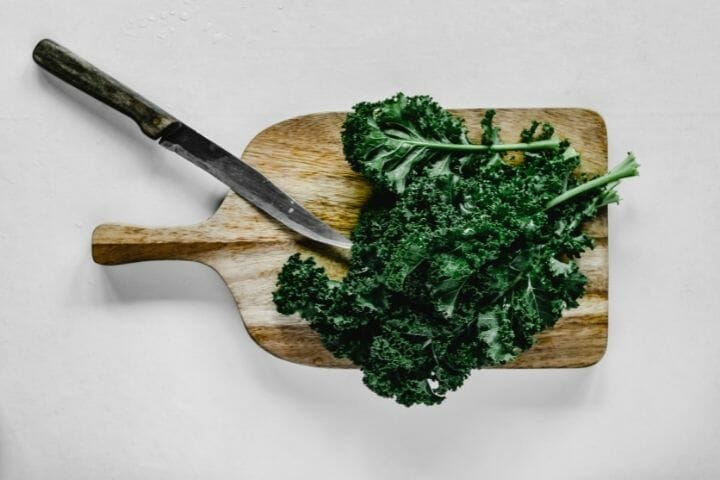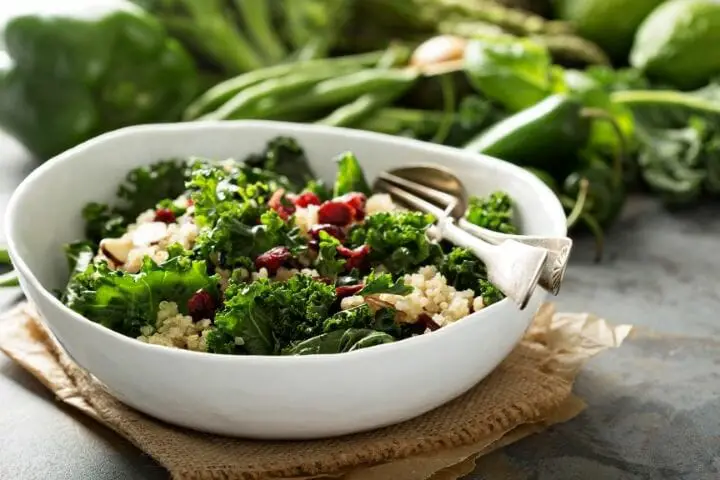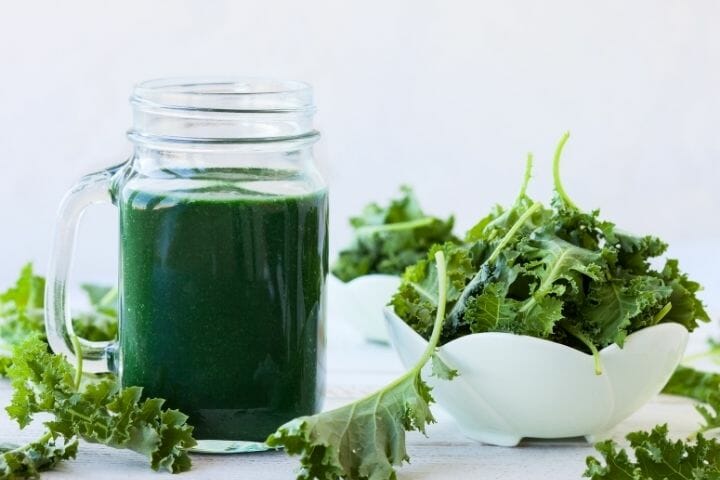Kale is known as a superfood, and for good reason: it is a powerhouse of vitamins and antioxidants. Here we list some of the kale benefits for skin and hair, and tips on how to add kale to your diet
Contents
Kale, or the queen of greens, is beneficial for health as well as skin. Many people have started using this popular green vegetable for their skincare. Kale is filled with antioxidants, including vitamin C, beta-carotene, and flavonoids that help reduce the incidence of skin diseases.

Eating kale helps improve your skin health. You should eat kale salads or add kale to your juices and shakes to enjoy its benefits. In this article, you will discover the skin benefits of the superfood kale and tips to add more kale into your diet.
What is Kale?
Many people also call it kale leaf cabbage. It belongs to the green plant species Brassica oleracea. Unlike cabbage, kale has green and purple leaves, and farmers grow three main types of kale: Curly kale, Red Russian kale, and Lacinato or Dinosaur kale.
Kale is a very nutritious green vegetable, high in fiber but low in calories and fat. Hence, kale is good for health, skin, and hair. Many people eat kale in order to enjoy the health benefits as it helps enhance vision and prevent arthritis. However, eating kale improves the health of your skin and hair.
You might like to read: Benefits of Avocado
Nutrient Profile of Kale
Kale is good for your skin but knowing what nutrients are present in kale helps you determine a healthier diet. Eating kale means gaining many nutrients that have significant benefits for your body and skin. Kale is low in total fat. Kale contains more vitamin C than most green vegetables, it is also rich in vitamin E and K. Other nutrients present in raw kale include:
- Calories 33
- 6 g total carbohydrates
- 25.5 mg of sodium
- 329 mg of potassium
- 2.9 g of proteins
- 2.0 g of dietary fiber
- 133% of vitamin A based on Reference Daily Value (RDI)
- 681% of vitamin K based on RDI
- 134% of vitamin C based on RDI
- 10% of calcium-based on RDI
- 5% of iron-based on RDI
- 7% of magnesium-based on RDI
Kale also contains other minerals in small amounts, including zinc, manganese, magnesium, selenium, and phosphorus. It also contains phytonutrients, including Carotene-ß and Lutein-zeaxanthin.

What Are the Benefits of Kale For skin?
It Helps Detoxify the Body and Skin From Within.
Eating kale helps detoxify your body and skin from within because it fills your body with the right balance of vitamins, iron, calcium, fiber, and antioxidants. The antioxidants, especially quercetin and kaempferol, help your body get rid of free radicals.
People form free radicals in their bodies due to pollution or artificial fragrances. Free radicals build toxins that damage your body and skin cells. Antioxidants help eliminate those free radicals that cause diseases like cancer. Kale also aids detoxification and helps improve liver health.
It Boost Skin Health
Many people use kale as a skincare booster. Kale provides a great amount of vitamin C that helps support your immune system and boost skin health. You should add kale to your daily diet as it supports the health of your skin, blood vessels, cartilage and helps heal wounds.
Vitamin C, Carotene-ß, and other flavonoids present in kale help cleanse your body from within. Kale also has other nutrients that help slow down the aging and chances of developing heart disease and cancer.
You might like to read: 10 Benefits Of Garlic
It is Packed With Vitamin A, C, and K
Kale is a powerhouse of vitamins; it contains vitamins A, C, and K with several significant benefits.
- People with dark circles should eat kale because it contains vitamin K, reducing purple pigmentation.
- Vitamin C strengthens collagen fibers while vitamin A repairs skin tissue.
- Vitamin K from kale helps tighten your skin, reducing wrinkles and fine lines.
- It contains iron that boosts the skin’s healing.
You can use kale to heal acne scars or blemishes on your skin. You can shop many kale-based products for your skincare. You can also add kale to your smoothie preparation or apply kale-based beauty products topically.

It Promotes collagen production.
Kales contain lutein, among other nutrients that boost collagen production. Your skin strengthens and becomes less vulnerable to skin disease with enough collagen production. The increase in collagen production gives you a more hydrated skin alongside an antioxidant effect.
Lutein also helps clean out the pores on your skin and offers you a healthier appearance.
Eat kale daily to experience this magical property that gifts your skin with a bright appearance.
It Decreases Inflammation
Kale is naturally fitted with compounds that act as antioxidants and help reduce inflammation and oxidative stress. You may damage your body and skin’s cells from excessive inflammation in your body. You may experience eczema, a guise of rashes, and psoriasis from inflammation.
Kale contains copper along with vitamin C, which helps control inflammation of the skin.
Carotene-ß also helps decrease inflammation of your cells and tissues and convert it to healthy skin.
You can also use kale-based moisturizers to neutralize your skin’s inflammation.
It aids in the treatment of acne.
People who eat kale observe a result in a reduction of skin acne. You should eat kale regularly as it helps fight against the free radicals that cause skin acne. However, the healing process from skin problems requires a patient.
Kale has great properties, including antioxidants, anti-infectious, and anti-bacterial that help reduce the harmful effects of skin infections and acne.

It Heals the Skin from sun damage.
Kale protects your skin from sun damage because it contains phytonutrients, lutein, and zeaxanthin. These phytonutrients help your skin stay hydrated and firm.
You should apply the kale-based product directly to protect your skin, or you can drink kale juice.
You might like to read: 14 Lesser-Known Benefits Of Turmeric
How to Use Kale For Skin
Nowadays, many people use kale for their health, skin, and hair. There are several ways to use kale to receive skin benefits. Some tips for using kale for skincare include:
Eat kale or drink kale juice daily.
You don’t need to apply kale topically to help your skin. Instead, you can eat it as it provides the same skincare benefits as when applied topically.
You can eat kale as a salad or prepare a meal with it. Make healthy soup or green smoothies using kale as prime ingredients.
People also use kale as a pizza topping. You should try chopping the kale leaves and making your snack delicious and nutritious. Now, you can boost your skin health while eating a snack.
Apply Topically
You can quickly make a kale facial mask using other beneficial ingredients, including honey, coconut milk, and lemon juice and apply it to your face. Appling kale directly helps in the absorption of its nutrients into the bloodstream.
You can also use store-bought kale serums for your skin. You can purchase kale skincare products such as lotions and apply them topically on your skin to boost your health. Kale serums are rich in vitamin C and cleanser your skin.

How to Add More Kale to Your Diet
Eating kale helps boost your skin health. Some tips for incorporating more kale into your diet include:
- You can simply add kale to your morning breakfast sandwich. You can also add kale to your evening salad.
- You can also prepare kale juice in large quantities and store it in your refrigerator. Drink it instead of a soft drink.
- You can also make kale soup or add kale to other ingredients’ soup.
- You can use a recipe of chips for baking some kale chips.
- You can cook kale with extra virgin olive oil, lemon juice, salt, and pepper. You should choose young kale leaves as they taste better.
You should cook kale frozen because it tastes better. You should thoroughly wash the kale leaves before cooking, and you should gently shake them after washing as it helps prepare you a more nutritious kale meal.
Where To Buy Kale?
You can purchase fresh kale at your nearest grocery store and supermarket. You can also buy raw kale powder from supermarkets or online groceries stores. Use fresh kale in your diet to receive skin benefits.
How To Buy Kale?
When buying kale, look for dark bunches with small to medium leaves. Moist, unwilted, and crisp kale is healthy, and you should use them. However, avoid using kale with tiny holes as it indicates insect damage.
Answers to More Questions About Kale
What vitamins does kale give you?
Naturally, kale is rich in vitamin A, C, B6, and K. These vitamins have several health, skin, and hair benefits.
Is kale good for hair and skin?
Many people use kale as it has many hair and skin benefits; it helps detoxify the body and protect skin and hair.
What kale does do to your body?
Kale increases the amount of vitamins A, C, and K and antioxidants that help boost your skin health.
Is kale good for wrinkles?
Kale includes lutein and iron, which help enhance collagen in your skin, the substance that reduces white lines and wrinkles. Kale also has Vitamin A which reduces the risk of early aging.
Who should not eat kale?
While kale has several benefits for your hair, skin, and overall body health, excess of anything can be bad. Kale contains a substance known as progoitrin, which is known to interact with iodine and block it, causing harm to your thyroid function.
This will lead to increased sugar levels and also cause weight gain. However, this is nothing to be alarmed over since you will have to take a lot of kale every day before this happens!

The Bottom Line
People consider kale as a beneficial superfood for the skin. Kale is full of antioxidants that help cleanse your body. You can use a different way to use kale in your diet and enjoy its skin benefits along with its health benefits. Kale helps detoxify your skin and promotes collagen production.
